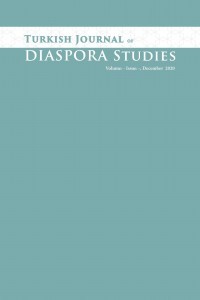Building the Bonds: A Comparison of Diaspora Engagement Policies in Kazakhstan and Uzbekistan
Building the Bonds: A Comparison of Diaspora Engagement Policies in Kazakhstan and Uzbekistan
Diaspora are thought to have political, economic, and social potential in both home and host countries. They are a source of economic investments and remittances for home countries, which can account for a significant portion of a country’s GDP in some cases. The diaspora’s expertise, knowledge, and skills can help social and cultural development in the country of origin. To gain access to these economic, social, and political resources, countries of origin develop diaspora engagement policies and incorporate the diaspora into national political discourse. Central Asian countries are developing relationships with diasporas and compatriot communities, as well as implementing state diaspora engagement policies, while taking diaspora capacity and migration outflow into account. However, the historical, political, economic, and social characteristics of the region’s countries have an impact on policy content and implementation. This paper investigates and compares the main characteristics of Central Asian countries’ diaspora policies, as well as seeks to comprehend and reveal the nature of the state governance system’s impact on diaspora relations. Two Central Asian countries, Kazakhstan and Uzbekistan, have been chosen as case studies to examine with document analysis methodology from 2016 to the present, as this period coincides with policy activation in both countries.
Keywords:
diaspora, country of origin, diaspora engagement policy, Kazakhstan Uzbekistan,
___
- Abdullaeva, M. (2021). New mechanisms for regulating external labor migration in Uzbekistan. https:// longreads.cabar.asia/labour_m_uz_en (Accessed on 09.03.2022).
- Серик, Сабеков. (2019, June 19). Skol’ko kazahov prozhivaet za rubezhom (Сколько казахов проживает за рубежом). https://www.inform.kz/ru/skol-ko-kazahov-prozhivaet-za-rubezhom_a3539766 (Accessed on 15.11.2021).
- CIS-legislation. (2018). About measures for further enhancement of state policy of the Republic of Uzbekistan in the sphere of cooperation with the compatriots living abroad. https://cis-legislation.com/ document.fwx?rgn=111088 (Accessed on 15.03.2022).
- Clifford, J. (1994). Diasporas. Cultural Anthropology, 9(3), 302–338. https://doi.org/10.1525/ can.1994.9.3.02a00040
- Cohen, R. (2008). Global Diasporas: An Introduction. Routledge. https://doi. org/10.4324/9780203928943
- Decree of the Government of the Republic of Kazakhstan. (2018). On approval of the Action Plan tosupport ethnic Kazakhs abroad for 2018 - 2022. https://online.zakon.kz/Document/?doc_ id=39828067 (Accessed on 23.03.2021)
- Ferrando, O. (2009). Central Asian States and their Co-Ethnic Minorities Abroad: From Diasporic Politics to Repatriation Programmes. International research, 1(1), 12-26.
- Gamlen, A. (2019). Introduction in Symposium on Alan Gamlen, Human Geopolitics: States, Emigrants, and the Rise of Diaspora Institutions, Oxford University Press. https://globalcit.eu/globalcit-reviewsymposium-alan-gamlen/ (Accessed on 09.03.2022).
- Gevorkyan, A. V. (2021). Diaspora and Economic Development: A Systemic View. The European Journal of Development Research. https://doi.org/10.1057/s41287-021-00432-x
- Heleniak, T. (2011). Harnessing the Diaspora for Development in Europe and Central Asia. Migration and Remittances Peer Assisted Learning (MIRPAL) discussion series. 87 p.
- Kuscu Bonnenfant, I. (2012). Constructing the homeland: Kazakhstan’s discourse and policiessurrounding its ethnic return-migration policy. Central Asian Survey, 31, 31–44. https://doi.org/10.1080/02634937.2012.650004
- Law of the Republic of Kazakhstan. (1997). On languages in the Republic of Kazakhstan. https://adilet.zan.kz/eng/docs/Z970000151_#:~:text=Article%206.&text=Every%20citizen%20of%20 the%20Republic%20of%20Kazakhstan%20shall%20be%20entitled,of%20languages%20of%20Kazakhstan%20people. (Accessed on 15.11.2021)
- Law of the Republic of Kazakhstan. (2011a). On Migration. https://adilet.zan.kz/eng/docs/Z1100000477#:~:text=The%20Law%20of%20the%20Republic,477%2DIV.&text=This%20 Law%20regulates%20public%20relations,social%20basis%20of%20migration%20processes. (Accessed on 15.11.2021).
- Law of the Republic of Kazakhstan. (2011b). On the Regulations on the Assembly of People of Kazakhstan. https://adilet.zan.kz/eng/docs/U1100000149 (Accessed on 09.03.2022).
- Laruelle, M. (2021). Central Peripheries: Nationhood in Central Asia. (1st ed.). UCL Press.
- LexUZ on-line. (2020). Resolution of the President of the Republic of Uzbekistan on measures to introduce a system of safe, orderly, and regular labor migration. https://lex.uz/docs/5699858 (Accessed on 23.11.2021).
- LexUZ on-line. (2021). Resolution of the President of the Republic of Uzbekistan “On “Vatandoshlar” Foundation Establishment. https://lex.uz/ru/docs/5570593 (Accessed on 09.03.2022).
- McSweeney, M., & Nakamura, Y. (2020). The “diaspora” diaspora in sport? A systematic literature review of empirical studies. International Review for the Sociology of Sport, 55(8). 1056–1073. https://doi.org/10.1177/1012690219869191
- Ministry of Information and Social Development of the Republic of Kazakhstan. (2020). Regulations of the Committee for the Development of Interethnic Relations. https://www.gov.kz/memleket/entities/etnic/about?lang=ru (Accessed on 09.03.2022).
- Olimov, M., Grote, J. & Gharleghi, B. (2020). Turning brain drain into brain circulation in Central Asia. Dialogue of Civilizations Research Institute. Volkswagen Foundation. 19 p.
- Otandastar Qory. (n.d.). About the Society Mission, goals and objectives. https://www.oq.gov.kz/en/statutory-tasks (Accessed on 09.03.2022).
- Ragazzi, F. (2014). A comparative analysis of diaspora policies. Political Geography, 41, 74–89. https://doi.org/10.1016/j.polgeo.2013.12.004
- Qazaq-Alemi.Kz. (nd.). World Kazakh Association. http://eng.qazaq-alemi.kz/ (Accessed on 09.03.2022).
- Safran, W. (1991). Diasporas in Modern Societies: Myths of Homeland and Return. Diaspora: A Journalof Transnational Studies, 1(1), 83–99. https://doi.org/10.1353/dsp.1991.0004
- Sökefeld, M. (2006). Mobilizing in transnational space: A social movement approach to the formation of diaspora. Global Networks, 6(3), 265–284. https://doi.org/10.1111/j.1471-0374.2006.00144.x
- Tittel-Mosser, F. (2021). Diaspora engagement: EECA. Regional Series. EUDiF.
- Vielmini F. (2021, February 2). Uzbek Communities in Central Asia as Human Connectivity Factor: Elements for a Kin-State Policy. https://www.ispionline.it/it/pubblicazione/uzbek-communities-centralasia- human-connectivity-factor-elements-kin-state-policy-29131 (Accessed on 09.03.2022).
- Werbner, P. (2015). The Boundaries of Diaspora: A Critical Response to Brubaker. In F. Klager and K. Stierstorfer (eds.): Diasporic Constructions of Home and Belonging. Walter de Gruyter.
- ISSN: 2717-7408
- Yayın Aralığı: Yılda 2 Sayı
- Başlangıç: 2021
- Yayıncı: Göç Araştırmaları Vakfı
